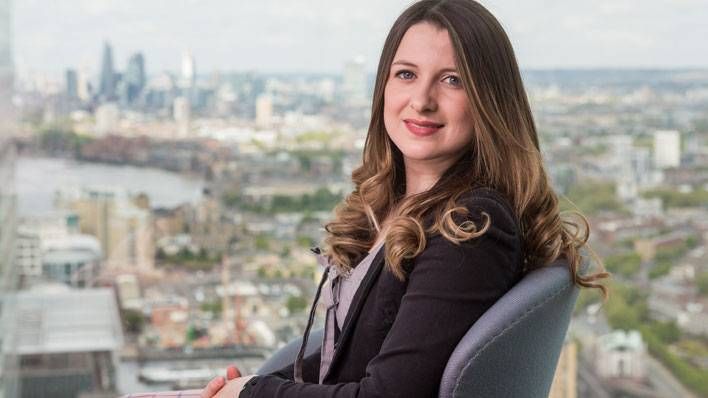
Why blockchain is "difficult and exciting"
“People I speak to often ask: ‘When is blockchain going to become a reality?’” says Isabel Cooke, Barclays’ Blockchain Research & Development Delivery Manager. “I tell them it already is a reality, but it’s a gradual thing. There are potential paradigm shifts – whether a shift to digital identities or central banks issuing fiat (government-backed) crypto-currencies – that might not come for five years or more, but there are also lots of things our team can look at right now about how we help the bank’s processes.”
Barclays’ blockchain team was set up in 2014, with a brief to look at different kinds of experimentation with digital ledger technology. Cooke says: “We work closely with various business units from the bank on all our experiments. It’s important that we’re not just a little bit of the bank that sits in the corner: we get involved with the rest of the bank. But we don’t want to be the people who are walking round the bank trying to plug in blockchain wherever we go. We’re looking for useful applications.”
If you asked ten people what they thought the benefits of the internet were, they’d have ten different answers. It’s similar with blockchain.
Barclays Blockchain R&D Manager
Cooke has no problems getting colleagues on board: “There’s so much going on in this space that we can be working with the teams in Barclays who are already really receptive, and then other teams will look and say, ‘that thing you did with Wave was really interesting, how can this help me?’ and that’s when we can get more decision makers involved with what we’re doing.”
The “thing” Barclays did with Wave was use distributive ledger technology to process a trade finance transaction involving the Ornua (the Irish Dairy Board) and the Seychelles Trading Company. Cooke says: “Our pilot trade brought the sign-off time from ten days to four hours. It reduced costs, added transparency, decreased risk and looked to improve the customer experience.”
Cooke says her department works closely with relationship directors, helping to identify companies to take part in pilots. She finds that “a lot of clients are excited by new technology and the opportunity to do things faster.”

Cooke says what makes the technology both “difficult and exciting” is that “it’s so broad it can change any industry where there are currently paper processes”
Key opportunities
Cooke says that there is no neat formula to help identify potential new blockchain experiments, and what makes the technology both “difficult and exciting” is that “it’s so broad it can change any industry where there are currently paper processes”.
Asked about the key blockchain opportunities, Cooke says: “If you asked ten people what they thought the benefits of the internet were, they’d have ten different answers. It’s similar with blockchain. Bitcoin solved a problem: it is censorship resistant digital cash. But there are other core elements to the technology, for example audit trails, and providing an immutable ledger.
Creating a really clear audit trail across organisations provides real value – whether that’s with land registration or trade finance. If we have a shared view of data on ledgers, we can then build business logic on top of that, and that can apply to interest rates swaps or smart contracts within the investment bank. Away from banking, digital identity is a fascinating area, and I hear a lot about the health space and building efficiencies in medical documentation.”
As a network technology with so many potential applications, Cooke thinks blockchain will not reach its potential without collaboration. “There is precedent for collaboration within financial services,” she says, “but those were usually banks coming together to solve specific problems. This is a bit different, it’s more about there being a growth technology out there and it’s looking really interesting, so how can we collaborate to make the most out of this? In some ways, it flips the problem-solving approach on its head.”
Partnerships in the new technology inevitably stretch beyond both sector and geographic border. “Blockchain is by its nature global and cross-industry. If we look at the Wave trade: Wave were a start-up from the Middle East, who took part in Barclays’ New York accelerator programme, and were working with our London trade finance team to improve a deal between companies from Ireland and the Seychelles. If you think about the collaboration that involves, it’s huge.”
The technology will undoubtedly provide more solutions for banks over the coming years, even before Cooke’s “potential paradigm shifts.” But for now, it’s a matter of evolution not revolution, she says: “If you were to build a banking system tomorrow from scratch, you would probably start with using distributive ledgers. But in banks with huge legacy systems, you can’t exactly go in and say: ‘I’m going to rip everything out and start again’, either from a business or customer viewpoint. It’s not about replacing, it’s about solving.”